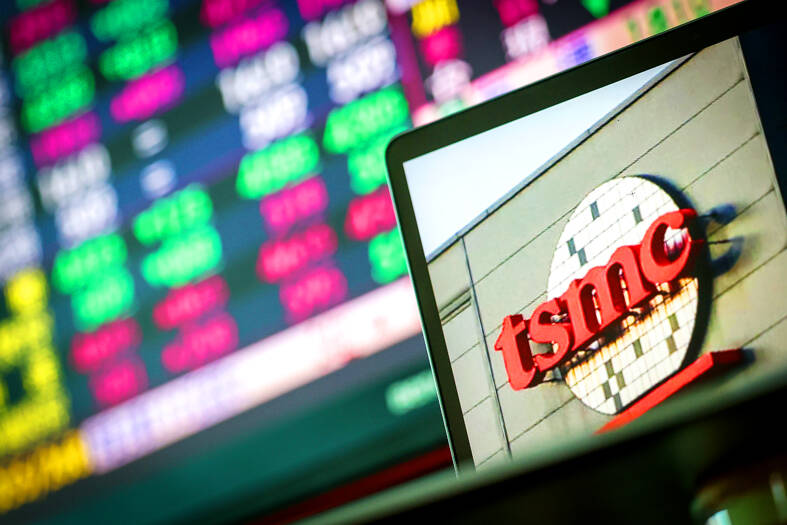The entry of chip giant Taiwan Semiconductor Manufacturing Co (TSMC, 台積電) into the elite club of the world’s most valuable companies is further proof that the generative artificial intelligence (AI) revolution is shaking up Wall Street.
TSMC, which is listed in Taipei and New York, on Monday briefly broke the US$1-trillion market capitalization barrier, putting it ahead of Tesla Inc as the seventh-most valuable technology giant on the stock market.
Also on Monday, Alphabet Inc, Apple Inc and Meta Platforms Inc hit all-time highs.

Photo: CNA
The top 10 of the world’s most valuable companies is headed by Microsoft Corp and Apple, closely followed by AI chip designer Nvidia Corp.
Their global stock market valuations exceed US$3 trillion on Wall Street.
Alphabet and Amazon.com Inc, which recently topped the US$2-trillion mark, follow in an ever-changing ranking.
Oil giant Saudi Aramco slipped into sixth place, followed by Meta, TSMC and Tesla.
“The semiconductor industry is now the leading sector in the S&P 500,” CFRA Research analyst Angelo Zino said recently. “It’s taken over the last 15 or 18 months. That shows you how much the world has changed.”
The explosion in worldwide demand for chips, boosted by the rise of computing-intensive generative AI, promises sustained expansion for the industry.
Chipmakers are not only attracting investors, but also a host of government subsidies.
US President Joe Biden’s administration, for example, has granted tens of billions of dollars in financial support over several years to help build chip factories in the US.
Worldwide sales of semiconductors, which include integrated circuits, microprocessors and memory chips, are expected to reach US$611.2 billion this year, a record for the industry, the Semiconductor Industry Association said.
Sales are expected to jump by 16 percent this year and 12.5 percent next year, the association said.
Nvidia, a designer of graphics processing units (GPUs), is the frontrunner of the craze, and has triumphed on Wall Street in recent months.
Nvidia’s GPUs are a crucial component in building generative AI and since the November 2022 launch of ChatGPT, its market capitalization has increased eightfold.
In the middle of last month, the Santa Clara, California-based group even briefly became the world’s most valuable publicly traded company, ahead of Microsoft at US$3.3 trillion.
“Nvidia’s GPU chips are the new gold or oil of the technology sector,” Wedbush Securities Inc analysts said.
For them, Nvidia, Apple and Microsoft are now engaged in “the race for the 4 trillion dollar market valuation.”
TSMC, with most of its factories based in Taiwan, is well-placed to also reap the rewards.
While Nvidia, which only designs chips, but does not manufacture them, remains discreet about its supply chain, it is widely believed that the bulk of its products are manufactured by TSMC.
The Taiwanese giant, which controls more than half of the world’s semiconductor demand, posted first-quarter sales of US$18.87 billion, up 13 percent year-on-year, while net income climbed 9 percent to US$6.97 billion.
As for Nvidia, its quarterly profit reached US$14.9 billion, a sevenfold increase over the previous year, on sales of US$26 billion.

SEEKING CLARITY: Washington should not adopt measures that create uncertainties for ‘existing semiconductor investments,’ TSMC said referring to its US$165 billion in the US Taiwan Semiconductor Manufacturing Co (TSMC, 台積電) told the US that any future tariffs on Taiwanese semiconductors could reduce demand for chips and derail its pledge to increase its investment in Arizona. “New import restrictions could jeopardize current US leadership in the competitive technology industry and create uncertainties for many committed semiconductor capital projects in the US, including TSMC Arizona’s significant investment plan in Phoenix,” the chipmaker wrote in a letter to the US Department of Commerce. TSMC issued the warning in response to a solicitation for comments by the department on a possible tariff on semiconductor imports by US President Donald Trump’s

The government has launched a three-pronged strategy to attract local and international talent, aiming to position Taiwan as a new global hub following Nvidia Corp’s announcement that it has chosen Taipei as the site of its Taiwan headquarters. Nvidia cofounder and CEO Jensen Huang (黃仁勳) on Monday last week announced during his keynote speech at the Computex trade show in Taipei that the Nvidia Constellation, the company’s planned Taiwan headquarters, would be located in the Beitou-Shilin Technology Park (北投士林科技園區) in Taipei. Huang’s decision to establish a base in Taiwan is “primarily due to Taiwan’s talent pool and its strength in the semiconductor

An earnings report from semiconductor giant and artificial intelligence (AI) bellwether Nvidia Corp takes center stage for Wall Street this week, as stocks hit a speed bump of worries over US federal deficits driving up Treasury yields. US equities pulled back last week after a torrid rally, as investors turned their attention to tax and spending legislation poised to swell the US government’s US$36 trillion in debt. Long-dated US Treasury yields rose amid the fiscal worries, with the 30-year yield topping 5 percent and hitting its highest level since late 2023. Stocks were dealt another blow on Friday when US President Donald

Industrial production expanded 22.31 percent annually last month to 107.51, as increases in demand for high-performance computing (HPC) and artificial intelligence (AI) applications drove demand for locally-made chips and components. The manufacturing production index climbed 23.68 percent year-on-year to 108.37, marking the 14th consecutive month of increase, the Ministry of Economic Affairs said. In the first four months of this year, industrial and manufacturing production indices expanded 14.31 percent and 15.22 percent year-on-year, ministry data showed. The growth momentum is to extend into this month, with the manufacturing production index expected to rise between 11 percent and 15.1 percent annually, Department of Statistics